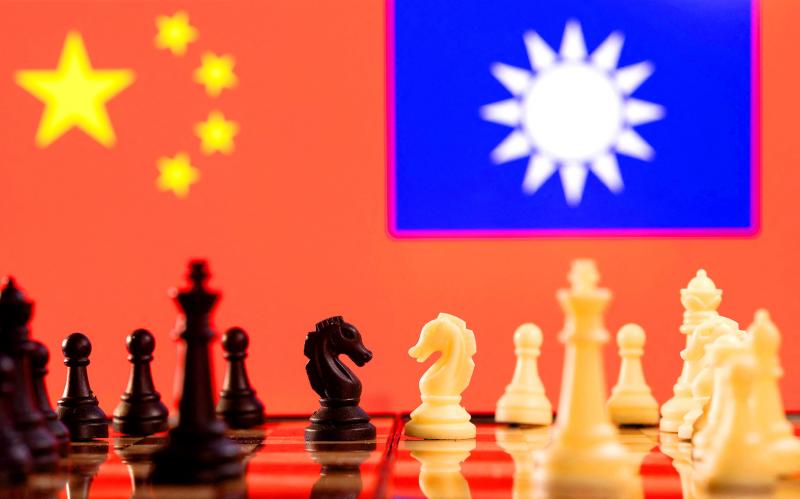China has changed tactics in its cognitive warfare campaign against Taiwan, now favoring divisive negative stories about Taiwanese society, rather than positive stories about China, an Academia Sinica researcher wrote in a recently published paper.
“In the past, when its economy was strong, China liked to use positive propaganda, including proposing a number of incentives and measures to attract Taiwanese,” Hung Tzu-wei (洪子偉), an associate research fellow at the academy’s Institute of European and American Studies, said on Friday.
However, with its economy disrupted by the US-China trade war, the COVID-19 pandemic and other factors, China has gradually turned toward “mobilizing negative sentiment,” for example, by spreading false reports on key social issues to divide Taiwanese, he said.

Photo: Reuters
It also creates negative sentiment and division through unilateral actions, such as banning imports of Taiwan’s agricultural products, he said.
Hung, who also conducts research for the Institute for National Defense and Security Research, analyzed data collected over two years from China’s cognitive warfare efforts against Taiwan, using the data to make predictions about China’s actions and ways to counter those actions.
His research was compiled into a paper published on July 19 in Oxford University’s Journal of Global Security Studies.
In his research, Hung found that even among people who reject fake news stories, there is still an impact through the energy spent on the cognitive processing of the false information.
Some of the disinformation created by Chinese content farms includes stories that aim to cause animosity toward the US, for example, by emphasizing incidents of racism toward minorities in the US, or by creating the narrative that the US turns its back on its allies, he said.
Hung said social media could affect China’s efforts in both positive and negative ways.
For example, young people in Taiwan are more media literate and able to see through Chinese propaganda — often using it as content for memes to satirize it, he said.
On the other hand, Taiwanese youth often access content through Chinese Web sites, or use Chinese social-media platforms like Tik Tok, which puts them at risk, he said.
“We should be vigilant, but not overly worried. Cognitive warfare is a good exercise for the immune system of a democracy,” he said.
Hung suggested the government combat China’s cognitive warfare efforts by improving transparency.
Citing examples, he said the Australian government regularly reports on the activities of foreign forces, requires academics and the media to disclose funding, and places restrictions on companies or media platforms that contravene fair competition.
“It is also important to fight back. China’s online cognitive warfare against Taiwan dropped sharply during its suppression of the Hong Kong pro-democracy movement,” he said.
“That means that China cannot win two cognitive wars at the same time,” he said.

‘DENIAL DEFENSE’: The US would increase its military presence with uncrewed ships, and submarines, while boosting defense in the Indo-Pacific, a Pete Hegseth memo said The US is reorienting its military strategy to focus primarily on deterring a potential Chinese invasion of Taiwan, a memo signed by US Secretary of Defense Pete Hegseth showed. The memo also called on Taiwan to increase its defense spending. The document, known as the “Interim National Defense Strategic Guidance,” was distributed this month and detailed the national defense plans of US President Donald Trump’s administration, an article in the Washington Post said on Saturday. It outlines how the US can prepare for a potential war with China and defend itself from threats in the “near abroad,” including Greenland and the Panama

A magnitude 4.9 earthquake struck off Tainan at 11:47am today, the Central Weather Administration (CWA) said. The hypocenter was 32.3km northeast of Tainan City Hall at a depth of 7.3km, CWA data showed. The intensity of the quake, which gauges the actual effect of a seismic event, measured 4 in Tainan and Chiayi County on Taiwan's seven-tier intensity scale, the data showed. The quake had an intensity of 3 in Chiayi City and County, and Yunlin County, while it was measured as 2 in Kaohsiung, Nantou County, Changhua County, Taitung County and offshore Penghu County, the data showed. There were no immediate reports of

The Chinese Nationalist Party (KMT) is maintaining close ties with Beijing, the Democratic Progressive Party (DPP) said yesterday, hours after a new round of Chinese military drills in the Taiwan Strait began. Political parties in a democracy have a responsibility to be loyal to the nation and defend its sovereignty, DPP spokesman Justin Wu (吳崢) told a news conference in Taipei. His comments came hours after Beijing announced via Chinese state media that the Chinese People’s Liberation Army’s Eastern Theater Command was holding large-scale drills simulating a multi-pronged attack on Taiwan. Contrary to the KMT’s claims that it is staunchly anti-communist, KMT Deputy

RESPONSE: The government would investigate incidents of Taiwanese entertainers in China promoting CCP propaganda online in contravention of the law, the source said Taiwanese entertainers living in China who are found to have contravened cross-strait regulations or collaborated with the Chinese Communist Party (CCP) could be subject to fines, a source said on Sunday. Several Taiwanese entertainers have posted on the social media platform Sina Weibo saying that Taiwan “must be returned” to China, and sharing news articles from Chinese state media. In response, the Mainland Affairs Council (MAC) has asked the Ministry of Culture to investigate whether the entertainers had contravened any laws, and asked for them to be questioned upon their return to Taiwan, an official familiar with the matter said. To curb repeated